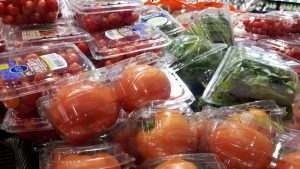Fresh produce industry identifies way forward for plastics
According to the report released by the Canadian Produce Marketing Association (CPMA), “The majority of problematic plastics identified by governments and NGOs have little correlation to plastic packaging used by the fresh produce industry. In fact, UNEP identified that, in the case of fresh foods in particular, an effective alternative to plastic packaging (including bags) does not presently exist.”
As it stands, plastic packaging has been shown to extend the shelf-life of produce in transit, at retail and in consumer homes. The report also estimates that “premature withdrawal of plastic packaging” could lead to economic losses of $2.5 to 5 billion in the form of food waste.
“The challenge is not plastic packaging per se; it is the lack of integrated systems that encompass the entire plastic packaging value chain,” notes the report. “Packaging has not been designed to ensure its ease of recyclability. The lack of commonly accepted and adhered-to global standards for post-consumer recycled (PCR) plastics, combined with worldwide access to high quality low-priced virgin materials, has discouraged packaging manufacturers from choosing recycled content over virgin.” The report also notes the disparity between recycling regimes at municipal and provincial levels, as well as the lack of overall national standards.
However, the produce industry has been making changes steadily over the past few years. According to the report, 50 per cent of tomatoes previously sold in clamshells have been replaced with flexible-film lids, reducing the volume of plastic by approximately 40 per cent. Opting for thinner films has also reduced the volume of plastic used to wrap English cucumbers by 30 per cent. All in all, “over 4,500 tonnes per year of single-use plastics have been removed from the environment by the tomato and cucumber sectors alone.”
The working group also developed a possible roadmap, with goals that include targeting and reducing problematic non-recyclable plastics, studying alternative packaging options, maximizing post-consumer recyclable content, developing new packaging materials, harmonizing recycling standards and more – all while working with packaging manufacturers, governing bodies and other impacted sectors.
Read the full and original article at GreenhouseCanada.com



